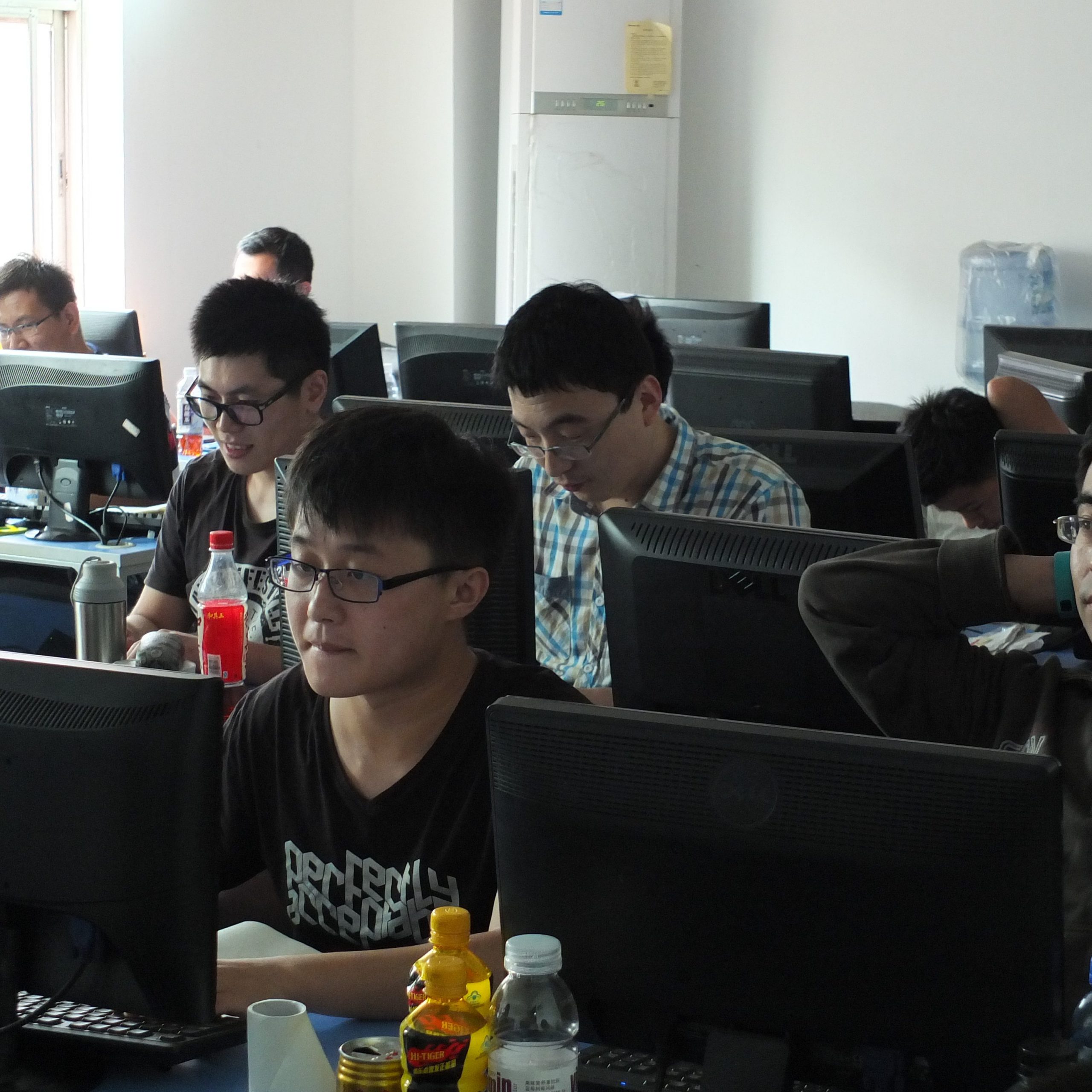
The promise of employability with better jobs and better incomes is fueling the growth of online vocational schools in China.
In a 2013 video for Code.org, a non-profit organization “dedicated to expanding access to computer science”, Valve Corporation co-founder Gabe Newell calls computer programmers “the wizards of the future.” If that is the case, then Yinhai Mansion in Beijing’s Haidian District may not look like Hogwarts from the outside, but inside young men and women pack into classrooms at the Uplooking vocational school to learn the intricacies of Objective-C, iOS programming, and Linux network administration as they seek to master the magic of their field.
Crammed into classrooms dominated by men, the students are looking for a more pragmatic approach to education that will lead to more money and a part to play in China’s much ballyhooed rise to a country of innovators.
Leading the Revolution
The nondescript Yinhai Mansion is just one of many centers in the capital’s geographically ill-defined Zhongguancun neighborhood—known as a technology hub inside Haidian District, home to many of Beijing’s universities and start-ups—the building crammed with IT students dreaming of a job with a multinational technology company. Inside, the whitewashed walls of the school’s three floors are broken up by classroom after classroom, the signs above the doors telling of the evocation within: Oracle, Cloud, KDE, POSIX and more.
The classrooms belong to the bricks-and-mortar IT vocational school of Uplooking Ltd, founded in 2005 by former Red Hat Certified Engineer and Linux Administrator Qie Xiaoye—who goes by the familiar yet curious nickname Shrek. Apparently Qie feels his name is too difficult to pronounce for most Chinese. And his wife’s English name is Fiona—the name shared by the green ogre’s better half.
Qie has been quick to latch on to a growing opportunity as he tweaks his business model. A 2014 report from iResearch, a research firm focused on all things internet in China, estimates that the number of online education learners in the country will surpass 120 million in 2017, an almost 80% increase in student numbers from 2013, and that online education revenue will more than double over the same period, growing from RMB 84 billion ($13.7 billion) in 2013 to RMB 173.4 billion ($27 billion) in 2017.
Of all the sub-sectors within the online education industry, vocational education stands out as one of the key drivers of the industry’s future success. Despite making up only 12% of all online education investment in China for 2013, the sector made up 38.6% of all online education learners for the same year.
Since 2013, Qie has focused his attentions on 5Win—an online IT school previously known as Woyingzhichang (WYZC) or “winning in the workplace”. Despite Uplooking expanding into the nine centers in nine cities throughout China that are in operation today, Qie says that he chose to direct his business towards online learning due to the lower costs and the ability to reach more people.
Wizards at Work
With over 10,000 hours of classroom instruction and 380 sets of original programs, 5Win bills itself as “China’s largest online IT vocational job training and services firm”. It is one of many online tech start-ups funded by China’s ever-hopeful army of angel investors, receiving $2 million in initial funding from seeding firm ZhenFund in 2013, since picking up $5 million in financing from the venture capital arm of the Chinese Academy of Sciences.
According to Qie, Uplooking and 5Win combined bring in around RMB 20 million in monthly revenue, or around $37.7 million annually, the majority of that coming from Uplooking as 5Win builds its membership numbers. 5Win currently has 800,000 registered users, with 100,000 of those categorized as “frequent visitors” (three visits a week or more), and 30,000 paying users. For the month of October 2015, the company has seen nearly 10,000 new accounts opened, up from around 4,400 over the same period last year, and expects a 4-8% conversion rate of those new accounts into paying members.

The company not only works closely with Oracle, Microsoft, Apple and Red Hat to certify their students as part of related courses, but also guarantees employment upon course completion, although not necessarily with those companies. A noticeboard in the hallway of the center details all the available positions, with salaries ranging from RMB 7,000 ($1,090) to upwards of RMB 10,000 ($1,558), excellent starting salaries given that China’s 2014 new college graduates were welcomed into the country’s workforce with an average starting salary of RMB 2,443 ($381), according to a 2014 survey from Peking University.
Qie believes that China’s higher education system lacks pragmatism and that the wrong things are being studied by too many people, that China’s traditional model of examination-based evaluation is failing its students.
“The purpose of vocational education is to link more directly to a job and the skills required in this job. It saves money, saves time. It is better than a normal university education, especially in China,” Qie says.
“In the traditional university setting, the teacher is an official, or they think like that. So they want control…. That is their job. Under the old system, our students are hopeless. But in vocational education, most companies are built by the people, not by the government. The student becomes a customer. So it is different.”
Filling in the Gaps
Qie’s opinions are becoming increasingly mainstream in China as its steadily growing number of new college graduates struggle to find work in the country’s slowing economy. A December 2014 year-end report from McKinsey & Company forecasting China for 2015 predicted that “a substantial proportion” of new graduates will not find jobs that require a degree. Indeed, many will find what they learned and how they learned at university has done little to prepare them for the 2015 job market in China.
Qie knows from experience just how wide the gulf is regarding what is learned and what is needed.
“I didn’t score high on the gaokao (the country’s National Higher Education Entrance Examination), and Kunming (University of Science and Technology, ranked 150 out of 192 Chinese universities by the Academic Ranking of World Universities at Shanghai Jiao Tong University) was the only place that would accept me,” Qie says. “And when I graduated, I still didn’t know anything. To get a good job, I needed to learn the same skills that I teach our students today. When you say ‘vocational education’, many people still think low of it, but it makes sense. Use people with work experience to teach others what they need to know.”
Despite long maintaining that unemployment in China rests at an unwavering 4.1% (although revised down to 4.05% in Q2 of 2015), the country has struggled in recent years with the looming specter of increasing unemployment among new graduates.
According to the National Bureau of Statistics, new graduates for 2015 reached 7.49 million in 2015, a year-on-year increase of 220,000 students (or 3.2%) at a time when the economy is slowing. Official estimates put the unemployment among new graduates at 7.74%, well above the 4.05% national figure, but unofficial estimates have placed the number as much higher, with Joseph Cheng, Professor of Political Science at the City University of Hong Kong, telling the BBC in 2014 that the figure could be closer to 30%. That would equate to 2.2 million from the graduating class of 2014 alone.
In response to the growing crisis, China has made no secret that it wants less college graduates and more young people trained in vocational educational institutions in the future as the country attempts to match students to jobs so to lessen the burden of unemployment and capitalize on a skilled population that can be trained and mobilized into action quickly. Both Chinese President Xi Jinping and Premier Li Keqiang have advocated for a greater vocational emphasis in Chinese education, the leaders’ words on the subject so well known in the hallways and classrooms of Yinhai Mansion that the echo of optimism is palpable.
Government initiatives like the Made in China 2025 scheme—the country’s plan to revolutionize its manufacturing industry from a sector of low-cost/middling quality to one of sophisticated and innovative processes producing high-quality goods—mean that government support for vocational education, online or otherwise, will continue into the foreseeable future. Combine that support with a youthful, tech-savvy generation dissatisfied with the current education system, and the potential is obvious. So obvious that the sector has become overcrowded and increasingly fragmented as start-up businesses flock to take advantage.
Perhaps the most well-known Chinese IT-skills training company is Tarena International, Inc. (TEDU), the company’s April 2014 IPO raising $137.7 million, although the company’s stock has taken a huge hit in recent weeks, falling from $12.18 per share on August 18 to $8.71 the next day as a result of missed expectations. The company is now under investigation for possible securities violations on behalf of investors amid claims of misrepresentation and misleading information.
Other online IT schools considered rising stars are XSTeach, the company partnering with the education arm of video-based social network YY Inc., and Jikexueyuan, known in English as Geek College, a company armed with $22 million in Series B funding secured in September 2014 and over 800,000 registered online learners, writes Wang Yidan , a Senior Education Specialist for the World Bank Group, on her blog.
And despite where his bread is buttered, Qie provides—like so many of his generation—a harsh evaluation of the youth of today.
“I think they take too much for granted. They grew up with the internet, with comfort, everything they need. They know nothing else,” Qie says. “I remember first seeing a banana when I was about 10 and was really amazed. We didn’t have those things then in northern China [in Inner Mongolia]. That’s hard for today’s generation to imagine, right?”
“The problem with Chinese grads is that they’re unwilling to accept a position they believe is below them. Someone who studied business management isn’t willing to accept a position in a factory. But that’s where the jobs are…. Today’s generation doesn’t want this type of job. They want high pay, good work environment, career mobility. That’s why many choose to study IT. It’s easy to get promoted and make more money.”
For Money and “the Way Forward”
Zheng Lei, a 24-year-old native Beijinger and former travel agent, is learning Objective-C, the main programming language used by Apple’s OS X and iOS operating systems, and user interface design in one of Uplooking’s four-month-long courses at a cost of RMB 18,000 (around $2,800). He believes both in and with his premier, telling over lunch of how the Chinese leader has professed a bright future for vocational education. But as he speaks over a mouthful of crushed cucumber salad, Zheng reveals a more rational reason for his career transition.
“Money. There is more money in IT,” Zheng says, telling of his dream to work as an iOS engineer or for a Chinese corporation such as web services company Baidu.

His 26-year-old classmate Li Feifei, a nursing major from Hebei, simply decided that she didn’t want to work nights and that IT was the way forward after talking with her roommate. She had no previous IT experience prior to starting at Uplooking but is finding the work easy enough.
For both, their optimism stems not from brand-name certification, but instead the promise of guaranteed employment. Not the guaranteed employment that Uplooking offers as part of their sign-up package, however, but that which comes from knowing they possess an in-demand set of skills that will provide direction and stability for years to come.
“Tech is one of the golden pin ups in China these days, receiving great support from the government and with many aspirational companies,” says Mark Tanner, founder of market research company China Skinny. “China is a nation of engineers, and many are recognizing the value of coding, so I would expect demand to continue to grow. Although Chinese spend a lot on education as a portion of their incomes, most Chinese still have relatively modest incomes, which would make competitively priced online learning attractive.”
The proliferation of these online educators has led to speculation that a bubble is on the horizon. A 2014 report from Deloitte suggests that a third wave of IPOs by Chinese online education companies will wash up on American exchanges by 2016. When asked about the increasing number of competitors amid a fragmented industry, Shrek Qie does not blink, instead holding firm to his vision and criticizing some in the industry for their unsustainable business model founded on the attainment of venture capital alone.
“I think the reason that there are so many companies is that most of them want to [take] the chance and build a company to make quick money, not for education…. I think most will fail because education is a long-term business, not like e-business or GroupOn style businesses,” Qie says.
Even so, the market is bound to consolidate as some businesses fold or get absorbed into larger market players, and to stay in the game means to embrace what online education is all about: innovation. It’s all very well to create a massive library of video content that instructs but such content is easy to duplicate and becomes stale quickly.
Surviving Competition
Qie is aware of the need for greater interactivity in his content and is experimenting with videos peppered with task-and-reward scenarios, calling them SuperVideos. While the “prize” of a “beautiful girl [appearing] to give a kiss” may play directly into the hands of critics who call much of the IT world sexist, such a move signals a shift in the right direction, albeit one with misplaced incentives.
“Online education providers have to really understand their target market and provide products, communication, and service that will best meet their needs to start, then constantly evolve with those changing needs,” Tanner says.
“The Chinese are avid researchers, and providers should have communications at every touch point, whether on websites, search engines, social media, app stores and so on. Partnering with related parties such as schools and education agents would be effective. Partnering with credible institutions and influencers is also a solid strategy. The right KOLs [key opinion leaders] endorsing products will be an effective way to stand out.”
As the industry becomes more competitive, it will no longer suffice to have an exhaustive library of resources in a government-backed sector. The secondary needs of the customer will become more important, needs that are not end-goal specific but have more to do with the process of learning. The socialization of the learning process has been suggested as one way to make online education more interactive and collaborative, as has gamification, a “mission-based” approach to learning that utilizes effective rewards.
Despite all the talk of fragmented markets and content shortcomings, Shrek Qie sees a more existential threat: the difficult nature of education and a growing apathy towards learning.
“I think that online education’s biggest enemy is not other companies, but education itself. Education is so difficult. For example, if someone has time, they want to chat with their girlfriend or play online games. They don’t want to learn something. It is a big problem in the business,” Qie says.
It is perhaps not as dire as Qie makes it appear, yet it must feel that way at times to a man who feels so strongly about tearing down the formalities of higher education. The future is coming despite’s Shrek’s pessimism, not just in China but throughout the world, and it is a future of connectivity that tailors training to jobs in a timely manner, transforming the learning process and ridding it of passivity through an empowerment of the masses never before seen in education history.
Update: An earlier version of the story misspelt Qie Xiaoye’s name as Qiu Xiaoye. The error is regretted.



















